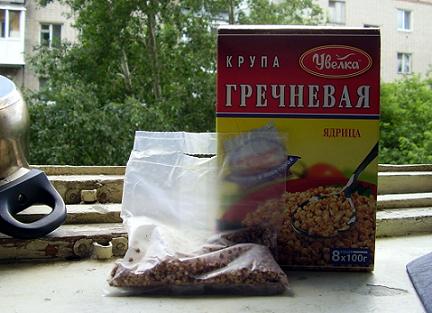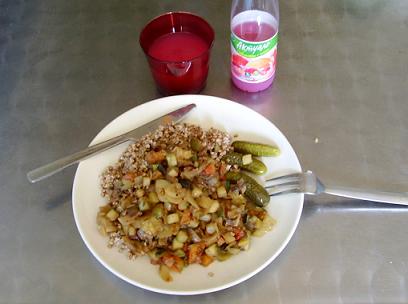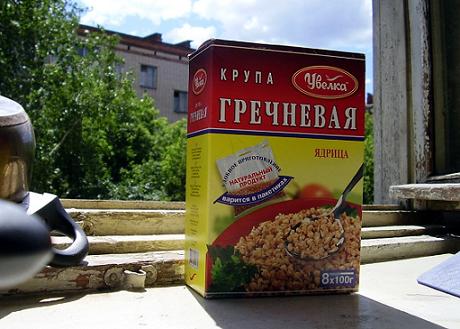Russian Food: «Слава гречке!» [Glory to Buckwheat!] Posted by josefina on Jun 26, 2009 in Culture, Soviet Union, Traditions
Introducing an essential part of Russian cuisine: «гречка»! «Гречка» is actually the ‘nickname’ («уменьшительно-ласкательный вариант» – don’t you just love the Russian language for applying diminutive even to such things as grains?) whereas the real name for buckwheat is «гречиха». In the stores you can also find it in boxes marked «крупа гречневая» [buckwheat] as pictured above.
Your first «гречка» experience is more often than not an unpleasant one. If you’ve never tasted «гречка» before in your life – and I hadn’t until September 2004 in Saint Petersburg – you’re bound not to like it the first time you try it. (There are also a slight number of people who fall in love with «гречка» at ‘first bite’ so to speak, let’s not forget about them but let’s also not focus too much on that tiny group of individuals.) After your first unpleasant experience with «гречка» there are two possible ways in which your relationship with it will progress. Scenario 1: you’ll smell it somewhere (it’s doesn’t matter if it is «в столовой» [in a dining hall] or «на кухне у русских друзей» [in your Russian friends’ kitchen]) and suddenly feel an instant urge – despite better judgment since you didn’t like it the first time you had it – to try it once again. You try it again and then your love for «гречка» is a firm fact of reality. Scenario 2: you’ll tell the story of your first encounter with «гречка» to someone and explain to them in detail how you just don’t get what the big fuss is about. The other person – be it a kind «бабушка» selling «семечки» [sunflower seeds] on the street in downtown Krasnodar or a fellow ‘expat’ while dining at an expensive French restaurant on Red Square – will then take time out of their busy day to inform you of how good for your body «гречка» is, how healthy you’ll become after eating «гречка» on a regular basis, and that you’re very silly for not liking it straight away once it will only do you good and you should be thankful for being introduced to it in the first place. «Гречка» is not only great because it is tightly connected with our favorite country Russia – Russia, for example, is the world’s largest producer of «гречка» since 2005 (when they beat China to it!) – in many ways, both cultural and historical and «гречка» even kind of smells like Russia (at least to my nose); «гречка» also lowers cholesterol, helps clean the body from heavy metal ions and protects against cardiovascular illnesses. And here’s another reason why «гречка» is worth paying a tribute to today: because it takes a long time for the body to absorb and thus that means you’ll feel full for a really long time after eating «гречка» and feeling full is a great thing, don’t you agree?

Now the question that arises is: how to cook «гречка»? Well, there are lots of lots of ways to do it! The easiest way – and perhaps only available in Russia – is to buy the kind of «гречка» that comes pre-packed into small plastic bags of 100 grams ready made to cook for 15 minutes on medium heat.
The magical thing about «гречка» is that you can cook it for every meal of the day: «на завтрак» [for breakfast], «на обед» [for lunch] and «на ужин» [for dinner]. With «гречка» you can never go wrong no matter what time of the day it is! For example, for breakfast you can make «каша» from «гречка» by boiling it and then eating it with «молоко» [milk], perhaps adding a splash of «варенье» [jam] or some «корица» [cinnamon]. Or you could skip all of the above and have a real rough Russian country style breakfast with just adding «масло» [butter/oil] and «сол» [salt] and downing it with some «чай» [tea] – and save the «варенье» for your tea and you’ll have yourself a true classic meal to start the day! Having «гречневая каша» for breakfast is not only the ‘patriotic choice’ but also the healthy choice; plus it will keep you going strong and feeling full all the way until lunch!
For lunch or dinner you can boil or fry «гречка» and serve it in a way that the Russians call «гарнир» [garnish; trimmings] with whatever comes to mind – «мясо» [meat], «курица» [chicken], «рыба» [fish] or «овощи» [vegetables]. It really does go well with just about anything. The important thing when dealing with «гречка» is to keep an open mind and remember: «гречка – это не только полезно, но и дёшево» [buckwheat is not just healthy but also cheap]. Here in the Urals people are much simpler than in the European part of Russia – it’s not only my personal opinion, they say so themselves – and rather easy-going when it comes to food. For a person living in the Urals fried «гречка» is best served up plain «с майонезом» [with mayonnaise]. Do you wonder why? Yekaterinburg is largest consumer of mayonnaise per person in the world – once again, not my personal opinion but stated as a historical fact in the Guinness Book of World Records. To make your meal taste ‘more Russian’ the easy trick is to add «укроп» [dill] or «петрушка» [parsley]. Something that is really tasty is to fry onions with mushrooms, then add these two spices – use both for increased sense of the Motherland – and serve it together with «гречка», of course!

Here’s another serving suggestion – my favorite, as a matter of fact. Cook «гречка» and fry up some «рагу» [ragout; vegetable stew] – serve together with a few «маринованные огурцы» [pickled cucumbers]. You can also add a splash of the best ketchup I’ve ever tasted – «кетчуп русский с укропом» [Russian ketchup with dill]. Probably it’s only available in Russia! Anyway, it is a miracle and amazingly tasty!
I’m a really huge fan of Russian cuisine. And I think that many of you who read this blog are just like me when it comes to Russian food – that you also get weak in the knees when thinking of «блины», know your exact favorite kind of «огурчики» [pickles – now that’s diminutive of cucumber for you!] and tell a homemade «оливье» [traditional Russian New Year’s salat] from a store-bought one. That’s why I think we should have a couple of more posts about Russian food this summer. Don’t you agree? Well, writing this post has made me really hungry. I’m actually going to go cook me some «гречка» for lunch right now…

Build vocabulary, practice pronunciation, and more with Transparent Language Online. Available anytime, anywhere, on any device.





Comments:
Rebecka:
I really wonder if buckwheat can be bought in Norway (where ANYTHING is exotic). I really like it too 🙁
Josefina:
Hi Rebecka! I’m really glad to hear that you like buckwheat too! In Sweden it’s pretty to hard to find in normal stores, but usually they have it in so called ‘health stores’. Since Sweden and Norway are pretty similiar in many ways, perhaps you should try your luck in such stores in Norway? Buckwheat in Sweden usually looks a little “whiter” and “smaller” (don’t really know how to explain the difference) than in Russia, but the taste is the same, and that’s what matters 🙂
trudy ringer:
One can never hear enough about Russian food. I love it and would like to hear more about it-especially how you add your own touch to it. полжалуйста!
piuma:
I bought a packet of каша in a little store called L’isola sovietica here in Italy where I live. I had it for breakfast and to be honest I’m still on step one, frozen by my first unpleasant experience. May be did’nt I cook it enough? After half an hour, it looked like concrete…All kind of каша is made of гречка? May be I bought the wrong one? I want to cook it properly for a little girl from Belarus.
thanks for your wonderful blog, i really enjoy each word you write
Cordelia:
It’s called BOVETE in Swedish and probably something similar in Norwegian..
I don’t think it’s very hard to get hold of it. I used to have it all the time as a kid because my mum liked to cook with it.
Richard Haller:
I am one of those “love at first bite” people. I had it for the first, and alas, only (so far) time last July in Samara in the flat of a relative of a friend. The word they used to describe it was “каша” which I mistakenly thought was “buckwheat”. I susequently concluded that it actually means something like “hot cereal”, a generic term.
Now I know what to call it to ensure I don’t get oatmeal instead, “гречка”! Мне нравится гречка! Hopefully I will be able to have some again when I am in Russia in September.
Rebecka:
You people clearly underestimate how shut off Norway is from the rest of the world! 😉 They don’t even have mandelmassa here, nor juice concentrate, and only one type of kefir. I know that it is available in Denmark since the Danish Bread Baking Lady recommended it for risotto on TV (Bullar av stål).
It’s odd, I always thought каша was just porridge, no matter what grain you used. And Richard, I also had it for the first time in Sarmara!
Russian Speaker from Marz:
Hey, don’t be unfair by implying that Grechka is a strictly Russian Federation thing. What about all the Grechka lovers in Kyrgyzstan, Uzbekistan, Ukraine–heck, practically the whole world!
Tina:
Hi
гречка is my favorite thing. My daughter is also a great fun of it.
We are Russians but we live in Britain.
British гречка is absolutely different from the one we eat in Russia. As it was mentioned above it is white and it is always hard( I tried different ways to cook it) and sticky.
When you cook Russian гречка pour water to the length of your second finger. Let the water evaporate then close the lid of the pot and let it steam for a while. When it is soft and fluffy then it is ready. The thing is if you want it very soft then cook it longer wait till the seeds crack. If it is like concrete as somebody mentioned then you did not have enough water and did not cook long enough.
One more thing to have more steam inside the pot I always wrap the lid ina tea towel and cook it extremely slow.
Bon appetite! Yummy!
piuma:
Thank you for your explanation,Tina. There was no cooking suggestion on the packet! I’ll try again
Rebecka:
Speak about timing! I just happened to glance in the right direction and see some Russian letters in the store (it was a bag of some sort of very hard, small, “donut” looking things, anyone know what those are?), and voilà what was standing next to it! http://littlang.blogspot.com/2009/06/aah.html
natasha:
I find that the best way to cook “loose” buckwheat is in the rice cooker.
Rebecka, those must be “сушки” [sushki], sort of a small hard bagel.
Martti Johannes Mäkelä:
Thankyou Susanna for the most practical tip fitting my cottage menu perfectly. In finnish Buckwheat seems to be ‘Tattariryyni’ I spent a week with Kuzbass scouts making an expedition to Finland and Lappland. I was amazed to discover how portable, flexible and delicious the ‘cuisine of Russia’ can be. I am sure you have also tasted the wonderful fruit-squash(?) served hot or cold…
best greetings,
Martti
Inaseona:
Now,i’m live in China,and i would like buckwheat…”'(
Anna:
The difference between white and brown buckwheat is that the former is raw and the later is roasted. Roasted, brown buckwheat is called kasha in English, and raw buckwheat is just buckwheat. It’s very hard to find any raw buckwheat in Russia. Raw buckwheat can be sprouted and it makes very healthy raw meal. I love raw buckwheat. If anyone knows where to find it in Norway, please share.
Stelios:
Hi, I would like to ask if the Russian name for Buckwheat means something related to Greece
Yessenia:
I’m one of those person who fell in love with buckweath at the first bite. My Ukrinian friend made me taste it and I don’t regret it. They served it with crispy pork and cucumbers. After they gave me several boxes when they move out I’ve been prepare with chicken and salmon (my favorite). It does make you feel satisfied after eating, but the taste it’s so good that I keep eating it until I can’t put anymore in my tummy. I’ve been looking for some online market who sell it. Because here where I live Mexican food it’s the master. I’m Puertorrican and we love flavorful food, Russian/Ukrainian one fill my espectatives. Спасибо!